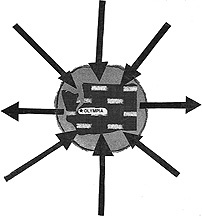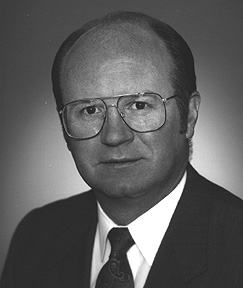
illustration by Christina Sporrong
(click for full sized image)
 illustration by Christina Sporrong (click for full sized image) |
At the Washington State Labor Council, we are constantly trying to speak to our members who are not yet involved. We need all our members to understand that if they win a good benefit in their local contract, they could lose that same benefit with the stroke of a pen in the Legislature. If the lawmakers that support such benefits for workers don't win their elections, laws hostile to workers and their unions will be enacted. The current debate over health care reform is a case in point. But it is also true for safety and health standards, on the job injuries, family and medical leave, overtime and child labor rules, to name a few issues that "crossover" to many union contracts.
These days, many issues that affect labor also affect other groups. For example, safety and health standards often concern environmentalists concerned about chemical exposures in our communities. Discrimination laws concern the gay and lesbian communities. And child care issues are of great interest to the women's community. These kinds of "crossovers" have created a need to build coalitions with community groups.
The Washington State Labor Council first began to work with the environmental community more than ten years ago when the OSHA\Environmental network was formed to lobby for workplace and community Right To Know laws about hazardous chemicals. In the past couple of years, the labor community has strengthened our relationship with the church community. Our work with "Hands Off Washington" this year may lead to a platform of progressive coalition activity. We have an ongoing working relationship with two key women's organizations-Washington Women United and the National Organization for Women.
Our challenge now is to create permanent coalitions with sympathetic community groups that transcend individual legislative goals or issues. We are also keenly aware that a strong coalition of progressive groups is needed to counterbalance the radical right's assault on workers. The strident public voice of the radical right needs to be answered, and the electoral "stealth" strategy of the radical right needs to be defeated. The Washington State Labor Council is committed to working as a coalition member to achieve these goals.
But coalition building is just one component of revitalizing Washington politics. We also plan to activate our members by recruiting and supporting our own members in legislative campaigns. One of the consequences of the term limits initiative is the need to find many more new candidates for legislative positions. Organized labor is in a great position to recruit and help our members all over the state. We are developing a recruiting program to do just that. Ten years from now, we would like to see a state Legislature that is made up of at least 50% working people. Our "citizen" legislature has been dominated for too long by an elite group of wealthy professionals. We fully intend to take advantage of terms limits to change the face of the Legislature.
This year we are already beginning that campaign with several key races. Eileen Cody, an active member of 1199NW\SEIU [Service Employees International Union] and a registered nurse, has won her bid for position 1 in Renton's 11th District. In Auburn's 31st District, Larry Brown, an active member of the largest private sector union in the state, IAM [International Association of Machinists] District Lodge 751, ran a strong campaign for the open seat. Another member of IAM 751, Ronnie Behnke, is launching her political career with a campaign in Kent's swing 47th district. And in Everett, IBEW [International Brotherhood of Electrical Workers] 191 union organizer Darrell Chapman is making a strong bid for the open position one seat.
When we win those races, we can look to our friends, such as Tacoma's Steve Conway, Everett's Dick King and Spokane's Lisa Brown, who are already in the state legislature to help us enact truly progressive policies. We can look forward to a return not only of Democratic majorities, but to a majority that really understands the problems faced by working families in our state.
One of the reasons we seem to be losing the public debate is because we are not articulating and actively promoting a clear vision and realistic solutions for our future. The Clinton/Gore campaign and many of us in the progressive community have promoted the idea that a healthy environment and healthy economy go hand in hand. Not only do voters relate to and believe in this concept, but it has brought together the labor and environmental communities to work on projects under this common theme. What we in the progressive community lack now is the creative imagery and detailed stories of how that is becoming or will become a reality based on good public policy. The translation of this campaign slogan into public policy seems to be the movement toward sustainable living. Working in concert with other progressive social change organization, I believe we must move toward a long-term vision of our sustainable future that incorporates the individual goals of social service, women, business, human rights, environmental, and labor organizations.
Yet another problem is the prevalent anti-government feeling throughout our society. We all know that government could be more efficient. Where we seemed to have dropped the ball is taking the responsibility for changing that. After all, in a true democracy, we are the government. It is not just our right but it is our responsibility to make government work for us. What that means is being involved - letting our public officials know how we feel about issues that affect our communities. I have done some workshops for activists around the state for the last several years. I often ask the question, "How many people in this room have spoken to their elected officials in the last several months about something that concerns them?" Generally, only a few people raise their hands. My conclusion is that we spend too much time talking amongst ourselves and too little time talking to decision makers and opinion leaders. The next step of course is to move beyond talking to elected decision makers and become one yourself.
In that vein, the ground work is being laid to form an effective electoral coalition amongst social change organizations. Both the Coalition for Livable Washington and an informal coalition of progressive political committees are currently working toward this end. What I anticipate emerging from this short term work is a long-term candidate recruitment strategy. While WEnPAC has in place a long-term recruitment strategy, our efforts will only be bolstered through a progressive community-wide effort. Often times, our recruited environmental candidates sympathize with labor or human rights or women's issues, but are not well versed in those issues. An effective recruitment strategy would bring together our recruited candidates with these other organizations assuring better educated and more electable candidates in the end. This is not going to happen overnight. Instead it will take leaders steadily plugging away for many years.
Our voices must be heard. In order to articulate our vision to the general public, we must relentlessly pursue vehicles to get our message out. We must urge those who share our vision, to talk and act and do so effectively.

Revitalizing Politics:
A Labor Perspectiveby Rick Bender, President,
For organized labor, revitalizing politics means that we must re-energize our members to become active politically. Union members who are already politically active lead the way for other members who are apathetic or at least non-involved in politics. Many local unions already have vital, active political action programs that take part in both elections and legislative battles. Some unions have a non-political culture. They focus exclusively on their individual contract, wages and working conditions.A Vision for the Future
by Beth Doglio, Executive Director,
Progressive politics is indeed under attack in this state. As the Director of the Washington Environmental Political Action Committee (WEnPAC) for the last several years, I have seen the continued growth of the "property rights" movement threaten long- term environmental protection for the sake of short-term individual profit. The gay and lesbian community has seen attacks from the far right in the form of threatened initiatives and defeated state human rights legislation. The labor movement has seen continued loss of membership. At the same time, the progressive community as a whole is failing to articulate a vision that will grasp the public's attention and gain their support. Instead, we have a disenfranchised populace with an anti-government attitude. This makes good public policy difficult to enact.
[Home]
[This Issue's Directory]
[WFP Index]
[WFP Back Issues]
[E-Mail WFP]





Contents on this page were published in the October/November, 1994 edition of the Washington Free
Press.
WFP, 1463 E. Republican #178, Seattle, WA -USA, 98112. -- WAfreepress@gmail.com
Copyright © 1994 WFP Collective, Inc.